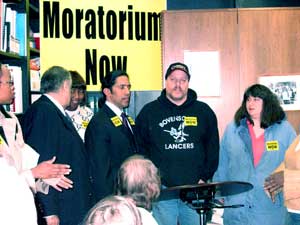Grassroots effort moves forward to save homes
By
Kris Hamel
Detroit
Published Apr 17, 2008 9:04 PM
At a press conference here on April 11, Michigan State Sen. Hansen Clarke
announced the introduction of a bill for a two-year mortgage foreclosure
moratorium into the State Legislature. Modeled on the Michigan Moratorium Act,
which was in place during the Great Depression, the law provides for a two-year
freeze on foreclosures and evictions.
|
Mich. State Sen. Hansen Clarke (center) with
Raymond Hintz and Loretta Hintz
from Detroit
suburb of Roseville, where many workers
face foreclosure.
WW photo: Cheryl LaBash
|
Clarke, who represents Detroit’s East Side district, stated: “The
time is now for a moratorium on foreclosures. This is the 40th anniversary of
the federal Fair Housing Act. The foreclosure crisis is impacting everyone,
with homeowners facing the terrible choice of abandoning their property or
being evicted, and abandoned homes destroying the value of entire
neighborhoods. When you’re in foreclosure, time is running out. This is a
state of emergency we are in. A two-year moratorium will give borrowers more
time to save their homes.”
Large yellow signs with the slogan “Moratorium NOW” provided the
backdrop for the press conference, which was held at the Michigan Legal
Services (MLS) office in downtown Detroit.
Over 60 people packed the room, including activists with the Michigan Emergency
Committee Against War and Injustice (MECAWI), Michigan Welfare Rights, Call
’Em Out, ACORN, Blight Busters, Metro Detroit AFL-CIO, and other unions
and groups.
In addition to Clarke, speakers at the press conference included Ted Philips of
the United Community Housing Coalition—also an MLS attorney assisting
people with tax foreclosures—and the Rev. Ed Rowe of Central United
Methodist Church. Several homeowners facing foreclosure and eviction also
spoke.
MECAWI organizer Jerry Goldberg told the audience how a moratorium was won in
the 1930s and “can be won again through mass struggle to force the
legislature and governor to act. This law will only be passed because of mass
pressure by the people, and we have to organize to make that happen.”
In Michigan, foreclosure is done not by the courts but by advertisement. After
a homeowner falls behind in mortgage payments, the lender sends her/him a
foreclosure notice. Four weeks after that, a “sheriff’s sale”
takes place. It’s a charade in which the lender usually buys the property
from itself. After the sheriff’s sale, a six-month redemption period
occurs in which time the borrower must pay back the entire amount due on the
mortgage or lose their home.
The moratorium law will allow the borrower to go to court for an automatic stay
to either delay the sheriff’s sale for two years or extend the redemption
period from six months to two years. The court will set a reasonable repayment
plan for the two years based in part on the borrower’s income and ability
to pay.
The act introduced by Clarke would be in effect for three years. This means
that anyone either in foreclosure at the time the law is enacted, or placed in
foreclosure during that three-year period, could take advantage of the
moratorium. It would give people emergency relief while the struggle continues
for a long-term solution to this crisis brought on by the banks.
Throughout the press conference, the important role that MECAWI has played in
publicizing and organizing for a moratorium was acknowledged by the
speakers.
Goldberg and Vanessa Fluker, both attorneys who help people in foreclosure and
eviction cases, were interviewed by a photojournalist from the Toronto Globe
& Mail. The Canadian newspaper is beginning a project that will show the
human side of the subprime mortgage crisis in the U.S., focusing on Michigan,
Florida and California. A MECAWI organizer took the reporter to Detroit
neighborhoods ravaged by foreclosures, with abandoned, vandalized homes. Fluker
and Goldberg were also interviewed by the CBC television network in Canada.
Media coverage of the moratorium bill included local television, local and
statewide radio stations, the Associated Press wire service and print media,
including the Michigan Citizen.
Near the end of the press conference, the attendees enthusiastically agreed to
utilize MECAWI’s next moratorium organizing meeting, already scheduled
for April 19, as a launching point for a coalition that will mobilize
statewide. Rev. Rowe offered space at his church as a base for carrying out
this struggle.
MECAWI will be holding public hearings and speak-outs around Michigan in a bold
campaign to garner support for the two-year moratorium law. A mass outpouring
of the people would force the politicians in Lansing to pass this law and give
sorely needed relief to all those affected by the mortgage foreclosure
disaster.
The April 19 planning meeting is at 1:00 p.m. at Central United Methodist
Church, 4th floor, 23 East Adams at Woodward, in downtown Detroit. For more
information and to get involved, contact MECAWI at 313-319-0870, write to
[email protected] or visit www.mecawi.org.
Articles copyright 1995-2012 Workers World.
Verbatim copying and distribution of this entire article is permitted in any medium without royalty provided this notice is preserved.
Workers World, 55 W. 17 St., NY, NY 10011
Email:
[email protected]
Subscribe
[email protected]
Support independent news
DONATE


